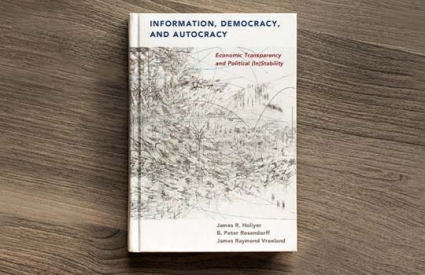Highlights:
- SDG financing and the risks of unintended consequences
- The allure of “dynamic databases”
- How influential are you?
- Man-made inequality, woman-made solutions?
- Regulatory exposure
- Funding prognostications
- TAI spotlight: From strengthening partnership with grantees to UK aid to Bangladesh
In case you missed it…
SDG financing and the risks of unintended consequences
 Photo: Pexels
Photo: Pexels
2019 will offer a chance to gauge how the world is faring in steps toward achieving the SDGs. This summer, 42 countries (see the list here) will present findings of their Voluntary National Reviews – providing more nuanced information on SDG progress in the run up to September’s UN General Assembly discussions. We’ll be particularly intrigued to read the Goal 16 updates. Overall, however, the picture is unlikely to be encouraging and Nancy Lee points to the prodigious gap in SDG financing as part of the problem – calling for more innovative financing approaches. In the meantime, countries are raising more revenues, but at the risk of generating a counter-productive increased tax burden on the poor.
How to get more equitable tax outcomes? Emmanuel Saez and Gabriel Zucman argue that we need higher marginal rates for the wealthiest, and boil it down to a choice between protecting democracy or reinforcing plutocracy. They may have an ally in UK entrepreneur Julian Richer, who calls for tougher targeting of tax dodgers to raise vital funds for public services. Wondering how to do that in practice? Carlos Scartascini emphasizes the need for policymakers to understand that interventions should aim at compliance across the full portfolio of taxes an individual owes. Do high profile prosecutions help encourage broader compliance? The case of Portuguese soccer star, Cristiano Ronaldo will offer another opportunity to find out. This week he negotiated to pay a fine of about 19 million euros for tax fraud and avoid a 23-month prison sentence.
Of course, in addition to strengthening enforcement, we also need to shift tax systems to keep up with changes in commerce. At the top of that list is finding a way to properly tax the digital economy – the subject of a forthcoming OECD report on how to best adapt the international corporate tax on taxing multinational groups to new digital business models. Germany has been warming up to this idea while the Swiss are resisting calls for what they call interim measures, such as a digital services tax.
The allure of “dynamic databases”
Talking of digital issues, the Tax Justice Network urges those agencies that manage corporate registers to embrace the digital age and translate static registries into dynamic databases more conducive to advanced analytics and verification. In this way they can take beneficial ownership verification to the next level and better take up the fight against illicit financial flows. The authors may be reassured by Europe’s steps to reinforce corporate transparency and open data with the new Public Sector Information directive. Can other regions emulate it?
Advanced analysis of corporate ownership will be increasingly dependent on machine learning and AI approaches. Ellen Zimiles and Tim Mueller document a strong case on how AI technologies can be applied today to some of the most pressing needs in banking. Yet will regulation keep pace with potential? Where do policymakers even start? Encouragingly, some are headed back to the classroom to move their thinking.
How influential are you?
Sticking with the classroom theme, some intriguing learnings in Oxfam’s new paper summarizing how its approach to ‘influencing’ has evolved since 1942 (when you can be pretty sure activists did not claim to be building “worldwide multilevel influencing networks.”) What should INGOs consider doing more of? A more inclusive consideration of advocacy audiences, long-game citizen engagement beyond a single advocacy campaign, and deeper understanding and support for grassroots are good places to start. Read alongside Isabella Jean’s analysis of why adaptive management depends on decision-making processes that effectively engage key stakeholders in reviewing relevant data, reflecting on options and practicing joint problem-solving.
Sticking with the power of inquiry, Duncan Green and colleagues over at IDS suggest we still have major blind spots on how agency and accountability play out in fragile or conflict-affected settings – a challenge for a sector still based primarily on assumptions that giving people access to information and channels for action should be enough for them to step up and act.
Finally, check out the new Network of Impact Evaluation Researchers in Africa, the first ever impact evaluation network made up of solely African scholars.
Man-made inequality, woman-made solutions?
Francesca Rhodes, Man-Kwun Chan and Anam Parvez Butt make the case for a gender lens to tax and budgeting -one step at least to rebalancing an economic system shaped by men that has reinforced inequalities. They might want to talk to those pushing the Women’s Entrepreneurship and Economic Empowerment (WEEE) Act in the US. Drew D’Alelio and Tanvie Jaluka at the Center for Global Development find much to applaud in the emergent legislation but point to much more scope for support to gender-equitable tax, expenditure, and budgeting policies.
How can countries promote democratic economic governance? Niccolò Milanese worries about a missing link between economic governance and social issues in Europe. Milanese argues that neither democratic institutions and procedures nor stronger processes of social dialogue and negotiation are enough to fill this void but welcomes EU accounting for the changes in the nature of work in addressing causes of populism and threats to democracy.
Of course, the European Union is not just concerned on deepening democracy within its borders. For example, see the EU’s support to CSOs in Zambia towards citizen engagement in democratic processes. In Turkey, CSOs have beaten all odds to remain a source of new ideas and inspiration for seven years, despite consistent reports of the country’s declining conditions for democracy and civil liberties. In Burundi, it’s a different narrative altogether as some INGOs have had to close shop after a new government directive to share staff ethnicity data with authorities.
One challenge CSOs face in all these contexts is how to take advantage of technology without being undone by it. Hopefully, a new three-year initiative launched by the World Economic Forum can help civil society better prepare for and respond to what they term the Fourth Industrial Revolution. TAI will be part of the conversation and hopefully, CSOs will now have enough bandwidth to use emerging tools and technologies to amplify more transparency, accountability, and fairness in government.
Regulatory exposure
It is too early to tell if weak regulation contributed to the Vale dam collapse in Brazil this past weekend, but there is little doubt that poor governance enables illegal mining activity and exposes the poorest to dire consequences. Workers have been trapped in an illegal coal mine in India’s East Jaintia Hills since December 13, 2018.
How to gauge such weaknesses? A new study on responsible mining reveals weak disclosure of environmental, social, and governance information by 12 Toronto-listed mining, small, and mid-tier companies with mine sites spanning the globe from Australia to Burkina Faso to Mexico to Kyrgyz Republic. EITI data could be a good complementary source, though scant on environmental and social information. A recent roundtable discussion concluded that there is more information being disclosed along the extractive industry value chain and it is increasingly timely, accurate and granular, but challenges remain in the form of shrinking civic space, corruption, and under-used data.
Looking big picture, the Financial Times examines Putin’s pivot to Africa. Russia’s increasingly bold engagement in continent may not bode well for those who care about transparency and governance of investments. For example, Congolese opposition politician Malanga sees Kabila’s courting of Russia as a way to circumvent Western requirements on transparency.
Funding prognostications
As January wraps up, here is the last of our new year prognosticating. With many sectors evolving in 2019, philanthropy is also experiencing some transformation. TAI members might want to see what resonates among these ’11 trends in philanthropy in 2019’ from a marked growth in non-profit media to concrete strategies emerging for implementing diversity, equity, and inclusion principles. Another sign of the times is the John and Laura Arnold Foundation restructuring to allow for more political advocacy support.
For grantees, this might be the best time for some training to learn the trends and mistakes to avoid in 2019 grant applications. Register for this webinar!
Long read of the week:

Information, Democracy, and Autocracy: Transparency and Political (In)Stability by B. Rose Kelly
An analysis of how information affects political and economic phenomena like mass protests, foreign direct investment, and the stability of dictatorships and democracies.
TAI spotlight
Strengthening partnership with grantees | Ford Foundation
Hilary Pennington, Bess Rothenberg, and Megan Morrison describe some of the specific changes the foundation is making to improve its relationship with grantees.
Sparking change through in-depth reporting | Luminate Group
Luminate explains their investment in the Bureau of Investigative Journalism towards in-depth investigative journalism.
Shifting our mindset on financing data | Hewlett Foundation
Sarah Lucas makes a case for a change of perspective in financing data for the achievement of SDGs.
Anti-corruption messaging to empower citizens | MacArthur Foundation
A report on how Shehu Musa Yar’Adua Foundation in Nigeria is using behavioral change messaging to empower citizens to hold others accountable.
UK aid to Bangladesh | DFID
DFID spokesperson explains that they didn’t fund a ‘rigged’ poll in Bangladesh.
Calls: Proposals, papers, speakers and course invites
- Co-Create the 6th OGP Global Summit Agenda – February 6
- New Media Ventures 2019 open call – February 11
- OECD and OGP Call for Innovative Open Government Cases – February 12
- Engaging with Civil Society in Belarus Call for Proposals – March 7
On the calendar
- ACM FAT* – 2nd conference on fairness, accountability, transparency dimensions of machine learning and AI – January 29-31(Atlanta, GA)
- Get to Know GrantStation – Feb 5, 2019
- Grant Trends and Common Mistakes: Make Your 2019 Applications Shine! – Feb 6, 2019
- Resilient Democracy – a strong and diverse civil society – Feb 6, 2019 (Brussels, Belgium)
- Early Market Engagement for a Multi-donor Funded Evaluation of OGP – Feb 11, 2019
- Early Market Engagement for a Multi-donor Funded Evaluation of OGP – Feb 14, 2019
- Data on Purpose Conference – February 19-20 (Stanford, CA)
- Story Movements 2019 – March 1 – 2, 2019 (Washington, DC)
- Open Data Day – March 2, 2019
- The Surprising Power of Liberating Structures – March 11 – 12, 2019 (Seattle, Washington)
- Open Gov Week – March 11 -17, 2019
- The Liberating Structures global gathering – March 13 -15, 2019 (Seattle, Washington, USA)
- TICTec Research Conference – March 19-20, 2019 (Paris, France)
- OECD Global Anti-Corruption and Integrity Forum – March 20-21 (Paris, France)
- The CEP Conference – May 7-9, 2019 (Minneapolis, USA)
- Csv, conf, v4 – May 8-9, 2019 (Eliot Centre, Portland)
- Collective Impact Forum Convening – May 14-16, 2019 (Chicago, USA)
- 2019 Open Government Partnership Global Summit – May 29-31, 2019 (Ottawa, Canada)
- RightsCon Tunis – June 11-14, 2019 (Tunis, Tunisia)
- Global Conference on Transparency Research – June 26 – 27, 2019 (Rio de Janeiro, Brazil)
- Tax Justice Network Conference 2019 – July 2 -3, 2019 (City, University of London, UK)
- Global Symposium (COPGS) on Citizenship, Governance, and Accountability in Health – October 15-18, 2019 (New Delhi, India)


